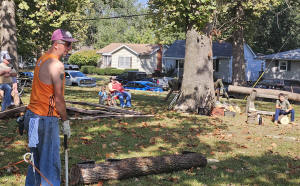|
The amateur railsplitting contest
at the Railsplitting Festival brought together newcomers and
seasoned competitors alike, offering a glimpse into the endurance,
strength, and tradition that define the historic sport. Despite the
challenges of heavy logs and demanding physical labor, the event
highlighted family traditions, first-time experiences, and community
support.
According to longtime organizer Bob Rankin, the task carries both
technical and historical weight. “Amateur will split six rails out
of their logs, they will split them in half, then make three rails
out of each half,” Rankin explained. “Each of our competitors is
allowed to have a judge. So you’ll see some of the professional
splitters moving around amongst them, giving them some pointers, but
they are not allowed to help split the rails.”
Rankin also noted the differences between today’s methods and those
used in Abraham Lincoln’s time. “Abraham Lincoln would have used
different tools. He would have had an axe, and a wooden maul and a
wooden hammer, instead of a steel sledgehammer, and maybe one real
thin wedge to maybe get started,” he said. “Other than that he would
take a limb and cut it down and sharpen it, those wooden wedges were
called a glut. And once you get a little crack started you take that
glut and start it into the crack you opened with your steel wedge
and drive that in with a wooden hammer, to make your rails.”
The contest field featured three competitors: Ryan Ballinger of
Atlanta, Illinois, Jackson Johnson of Lincoln, Illinois, and
first-time participant Hayden Pilchard of Downs, Illinois. After a
grueling session, Pilchard claimed victory with a winning time of
six minutes and six seconds.

For Pilchard, the victory came as a
surprise. “First time. Honestly I got super lucky,” he admitted. “I
picked a super good log, it looked like #3 over there was gonna be
the good log to have but inside it fought him a lot. So that’s just
part of it, you get a good log or you don’t. I was super tired by
the time I was done, so I can’t imagine what all the other guys are
going through.”
Ballinger continued a family tradition by entering the amateur
contest. “I started when I was 10. I been doin’ it ever since, it’s
family tradition,” he said. Ballinger stated his father, Casey
Ballinger, planned to compete in the professional splitting later in
the day. He brushed off the blisters he earned from his effort while
splitting. “That’s an everyday thing. Hard work pays off.”
[to top of second column] |


Johnson, who
completed the course in 24 minutes and 55 seconds, reflected on
how life has changed since he first tried the competition years
ago. “It takes a lot of energy,” he said. “Five or six years ago
I used to be a lot more fit. I used to do distance running and
run a whole bunch.
Now I have a lawn care business, and I’m super busy with three
kids and being married. And I just don’t get to be as active,
but I enjoy it. I appreciate what they do here, everybody enjoys
it.”
Rankin stressed the importance of newcomers like these
competitors to the future of the sport. “These guys have put in
hard work, that half hour of extremely hard work, they’re the
future of our organization,” he said. “Getting started with
junior and amateur before they can come up to the professional
ranks. That’s what we need to keep this tradition alive.”
Community support also played a large role in the event, with
numerous sponsors helping to provide resources and materials.
Among those recognized were Michelle Bauer of Country Financial,
Chris Coyne from State Farm Insurance, the City of Lincoln,
Culver’s Restaurant, Dr. Dennis Caroll, First National Bank in
Treemont, Mac and Tires Appliances, Heartland Bank and Trust,
Keystone Solar Farm, and J. Williams, who provided the logs.
Decorative mums and plants were donated by Par Farms Greenhouse.
In addition to these, several other local sponsors contributed
to making the contest possible
The combination of hard work, historical lessons, and community
backing ensured that the amateur railsplitting contest not only
challenged its competitors but also carried forward a tradition
deeply tied to Lincoln’s history and the pioneer spirit.
[Sophia Larimore] |